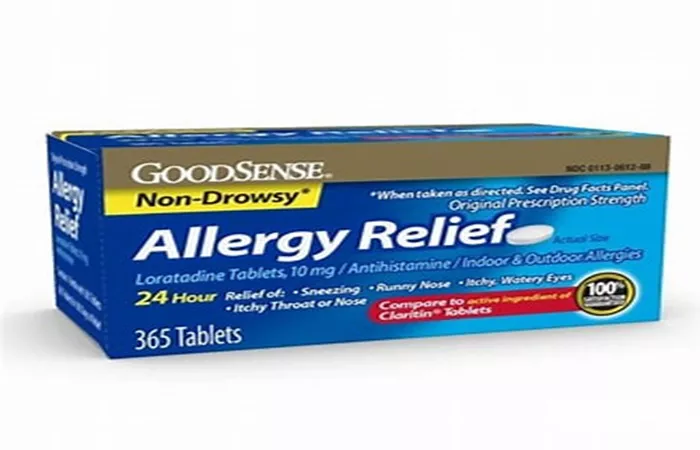Allergies can significantly impact daily life, causing symptoms like sneezing, runny nose, itchy eyes, and nasal congestion. Finding the right allergy medicine is crucial for managing these symptoms effectively. This article will explore the healthiest options available, focusing on their safety, effectiveness, and suitability for long-term use.
Understanding Allergy Medications
Allergy medications come in various forms, including antihistamines, decongestants, nasal sprays, eye drops, and corticosteroids. Each type works differently and is suitable for different symptoms and severities of allergies. The healthiest allergy medicine is one that provides relief with minimal side effects and is safe for long-term use.
9 Types of Allergy Medications
Antihistamines
Antihistamines work by blocking histamine, a chemical released by the immune system in response to allergens. They are available in both first-generation and second-generation forms. Second-generation antihistamines are generally preferred due to their lower likelihood of causing drowsiness.
Cetirizine (Zyrtec)
- Active Ingredient:Cetirizine
- Form: Tablet, liquid
- Recommended Age: Adults and children ages 6 and older
- Symptoms Treated: Runny nose, sneezing, itchy/watery eyes, itchy nose or throat
- Frequency: Once daily
- Strengths: Effective for moderate to severe symptoms, provides long-lasting relief.
- Side Effects: May cause mild drowsiness in some users.
Fexofenadine (Allegra)
- Active Ingredient: Fexofenadine
- Form: Tablet, liquid
- Recommended Age: Adults and children ages 6 and older
- Symptoms Treated: Runny nose, sneezing, itchy/watery eyes, itchy nose or throat
Frequency: Once daily - Strengths: Least likely to cause drowsiness, fast-acting relief.
- Side Effects: Generally non-drowsy.
Loratadine (Claritin)
- Active Ingredient: Loratadine
- Form: Tablet, chewable tablet
- Recommended Age: Adults and children ages 6 and older
- Symptoms Treated: Runny nose, sneezing, itchy/watery eyes, itchy nose or throat
Frequency: Once daily - Strengths: Most consistently non-drowsy, gentle on sensitive users.
- Side Effects: Generally non-drowsy.
Nasal Sprays
Nasal sprays are highly effective for relieving nasal congestion and other nasal symptoms. They come in both corticosteroid and antihistamine forms.
Fluticasone Propionate (Flonase)
- Active Ingredient: Fluticasone
- Form: Nasal spray
- Recommended Age: Adults and children ages 12 and older
- Symptoms Treated: Nasal congestion, itchy/watery eyes, itchy nose, runny nose, sneezing
- Frequency: Once daily
- Strengths: Highly effective in reducing inflammation and congestion.
- Side Effects: Potential for nasal irritation, nosebleeds.
Azelastine (Astepro)
- Active Ingredient: Azelastine
- Form: Nasal spray
- Recommended Age: Adults and children ages 6 and older
- Symptoms Treated: Nasal congestion, runny nose, sneezing, itchy nose
- Frequency: Once or twice daily
- Strengths: Antihistamine nasal spray that provides rapid relief.
- Side Effects: May cause a bitter taste in the mouth.
Eye Drops
Eye drops are specifically designed to relieve eye-related allergy symptoms such as itching, redness, and watery eyes.
Olopatadine (Patanase)
- Active Ingredient: Olopatadine
- Form: Eye drops
- Recommended Age: Adults and children ages 2 and older
- Symptoms Treated: Itchy eyes, watery eyes, redness, inflammation
- Frequency: Once daily
- Strengths: Effective in managing eye symptoms.
- Side Effects: Generally well-tolerated.
Ketotifen (Zaditor)
- Active Ingredient: Ketotifen
- Form: Eye drops
- Recommended Age: Adults and children ages 2 and older
- Symptoms Treated: Itchy eyes, watery eyes, redness
- Frequency: Once daily
- Strengths: Provides quick relief from eye symptoms.
- Side Effects: Generally well-tolerated.
Decongestants
Decongestants provide rapid, short-term relief from nasal and sinus congestion. However, they are not recommended for long-term use due to potential side effects.
Pseudoephedrine (Sudafed)
- Active Ingredient: Pseudoephedrine
- Form: Tablet, liquid gel capsules
- Recommended Age: Adults and children ages 12 and older
- Symptoms Treated: Nasal and sinus congestion
- Frequency: Every 4 to 6 hours
- Strengths: Provides rapid relief from congestion.
- Side Effects: May cause insomnia, headaches, increased blood pressure.
Combination Medications
Combination medications combine the effects of antihistamines and decongestants to provide comprehensive relief.
Loratadine and Pseudoephedrine (Claritin-D)
- Active Ingredients: Loratadine, Pseudoephedrine
- Form: Tablet
- Recommended Age: Adults and children ages 12 and older
- Symptoms Treated: Nasal congestion, sinus pressure, sneezing, runny nose, itchy/watery eyes, scratchy throat or nose
- Frequency: Twice daily
- Strengths: Provides relief from both nasal and non-nasal symptoms.
- Side Effects: May cause drowsiness and other side effects associated with decongestants.
Conclusion
Managing allergies effectively requires choosing the right medication based on your specific symptoms and needs. Second-generation antihistamines like cetirizine, fexofenadine, and loratadine offer safe and effective relief with minimal side effects. Nasal corticosteroids like fluticasone propionate are highly effective for nasal symptoms. Always consult with a healthcare provider to determine the best treatment option for your specific needs. With the right approach, you can manage your allergies and improve your overall quality of life.
Relative topics:
How to Talk to Your Child About Their Food Allergies?
How I Hike, Bike, and Run During Allergy Season: 5 Strategies

